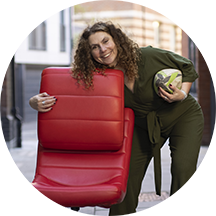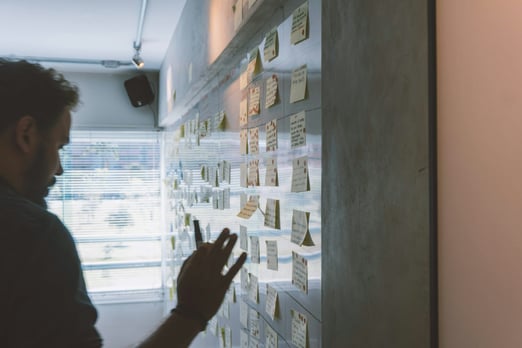Agile coaching
Agile & Me
07 December 2022 • 6 min read
.png?width=1920&height=836&name=Untitled%20design%20(15).png)
What is Agile? How can it help your organisation? And what impact can it have? For the latest in our AND Voices series, we talk to two of our AND Digital coaches, Paul Harding, Agile Coach AND Aspiring Sketchnoter, currently working with AND Club Jemison, and Chris Davey, Agile Coach AND Gamer, Club Newton, about their experiences.
Want to explore ways your brand can achieve more through being Agile? Find out more here or get in touch for a chat.
AND: When it comes to Agile coaching, what brings the greatest impact for the clients you work with?
Paul: We coach clients to focus on outcomes rather than outputs, developing Agile principles and overcoming challenges so that the teams can deliver value more quickly to their customers.
Chris: As external Agile coaches we have no political or organisational bias. This gives us the ability to help our clients explore a little more deeply what good practice looks like regardless of their existing ways of working. It also allows us—perhaps even necessitates us—to explore how our clients currently operate and why. As enablers and guides to positive change, we can help generate an environment where change is desired and our clients feel enabled and supported to make those changes.
AND: What’s the biggest personal impact you have on the people you work with?
Chris: Being a qualified coach enables me to have transformational conversations with those that want coaching (with a big C). The biggest impacts are when you enable them to tackle not just career or work-related issues but resolve challenges in their lives that are limiting their success.
Paul: Can I answer that question another way? The impact that I take the most satisfaction from is seeing the individuals that I work with grow and develop—that's what gives me the ‘buzz’. Coaching is an enabling role so the biggest personal impact I've had is witnessing people become more rounded individuals, challenging them to overcome their personal barriers. Some of these people are now in management and directorship roles.
AND: How do you describe Agile to clients who are perhaps unaware or wary of it?
Paul: Agile is a way of thinking, a mindset so to speak. It's an iterative way of working that helps teams deliver better quality, faster to customers. There's a focus on faster feedback cycles and this transparency can be a challenge for those that are wary of it. There is no big bang to being Agile, rather it is a Kaizen process that focuses on small, incremental changes. It's also worth mentioning that many of the key practices are not reserved just for software development. One great success story I have had was with a copywriting team.
Chris: With client teams where there is a known resistance, the best approach is to simply not talk about Agile. Agility is a natural outcome of autonomous, enabled and supported teams who have a strong understanding of their value proposition and feedback loops, enabling them to understand the impact they are making in the world. By ignoring conversations about Agile and searching for pain points or blockers to the above state, we can help teams identify their own route to better, more flexible ways of working.
AND: Why is Agile such a big part of AND's approach?
Chris: First we need to explore why it matters for our clients. The world is changing at an ever-faster rate. That makes it incredibly difficult as a producer to find a space for your product and ensure that it stays relevant in a world that is changing at such speed. Agility enables our clients to adapt to the changes happening in the world and harness that adaptation to their advantage.
To enable our clients to do this we have to live and breathe not only Agile values, but also curiosity, experimentation and the ability to leverage our club model to discover what works without heavy, top-down policies.
AND: How can Agile help businesses through tougher times?
Paul: The transparency Agile can bring can help businesses in tough times by helping them focus on what is most important to them. It helps elevate what value is being delivered and keeps the desired outcome in focus, which could also lead to a change in direction.
AND: What’s been your most rewarding client experience?
Chris: I’ll just pick the most recent: I was asked to help a client team who had poor motivation. They felt they were always doing low value work, often cleaning up others' messes and they were rarely celebrated. There was a lot of trepidation from stakeholders that the day would become a complaints session, but I crafted the day to be a relaxed and entertaining look at what makes a high performing team, how personal motivation works, and a dive into the team members’ personal values.
Through the lens of what ‘good’ looks like the team were able to identify the steps they could take to get there. They realised they had the autonomy they needed to do high value work and demonstrate the impact they were making.
Watching the realisation from the team that they could shape their environment made the day very rewarding. The fact that they then decided to implement regular goals (sprints), set aside time to improve what they do (retros) and review sessions to understand their impact (sprint reviews) just re-enforces that agility is a natural outcome for engaged teams.
AND: Give us a quick rundown of the Agile coaching process at AND
Chris: There isn't a one size fits all process for Agile coaching at AND. We have to dance in the moment and react to the adapting needs of our clients and teams. However there are some basic principles that probably apply to many engagements:
- Understand what outcome the client is looking for and why.
- Understand the current state. We do this via observation, interview or just being with the teams involved.
- Understand what metrics are in place and what might be needed to demonstrate progress towards the desired outcome.
- Train, mentor or coach the team as appropriate.
- Understand the impact and adapt as necessary.
AND: How do our Agile ways of working help us support our clients?
Paul: Our Agile coaches provide support to our ANDis, empowering them to drive our clients to digital independence. Even if a client doesn't interact directly with an Agile coach, they can be assured that they are available to support both our and their teams. In addition, the Agile coaches can facilitate process improvement training for all levels and provide practical guidance through workshops.
AND: The team has just won a Be More Human award. What is the impact of that win on the team? What do you believe is its impact on clients?
Paul: For me, this award recognises that the AND culture lives and breathes its values of Wonder, Share and Delight. As a team, we meet regularly to look at improving what we do. At the same time, it provides a forum for feedback and gaining honest opinions. The award shows that we are having effective conversations within our teams which puts us in a great place to contribute to our clients’ success.
Chris: Agility has much more to offer our clients and we have some amazing executive coaches on the team who could be making a remarkable difference to our clients. My hope is that this award brings these things into focus and plants the seed with our clients that there is more we can be supporting them with.
AND: How can clients access AND’s Agile coaches?
Paul: You can access coaches via the AND Club, typically via the Club’s Service Delivery team.



